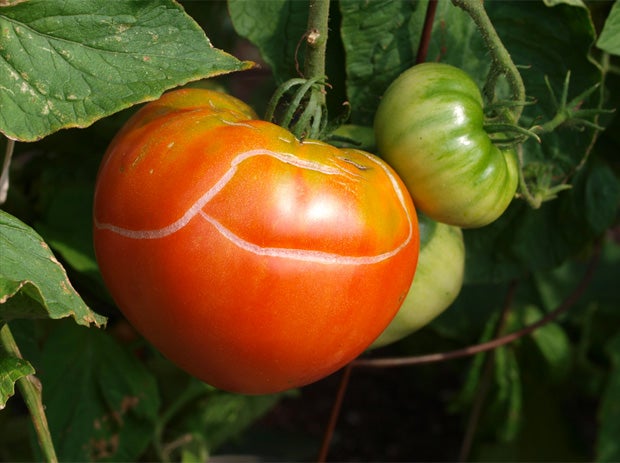Why your tomatoes may be cracking and splitting on the vine
ListenMike explains what to do when your hydrangeas aren’t blooming, when and how to properly prune your fruit trees, how to use motion-activated sprinklers to deter unwanted visitors, the best way to transplant rose bushes, and why your tomatoes may be cracking and splitting on the vine. Plus, Mike speaks with Patrice Sheehan, the tree program manager at the Delaware Center for Horticulture, about bare root trees.
Question of the Week:
“I have a problem with my heirloom tomatoes cracking after heavy rain (a rarity here in central Texas, but it does occur). — Brooks in Austin, TX
“Although I don’t have any big problems growing tomatoes, they do tend to split. What am I doing wrong and how do I fix it? — Kim in Norwich, CT
“After reading your tomato growing book last year, I am happily harvesting organic Brandywines and Romas. However, most of the Brandywines developed deep crevices up near the stem. Other than that, they are beautiful. I looked in your ‘A to Z archives’ but didn’t find any answers. Do you know why tomatoes would crack?” — Ed in Milmont Park, PA
How to prevent your tomatoes from splitting and cracking »
Highlights from show for September 21, 2013:
What to do when your hydrangeas aren’t blooming
Rhonda from Cinnaminson, NJ is having problems with her hydrangeas this year. For the first time they are not putting on a show of beautiful pink and blue blooms that they normally would. In fact, they have not bloomed at all. She assures Mike that she never prunes, but she does feed them Miracle Gro. Mike balks at this and says,”that’s not good for them”, “that is a chemical fertilizer and it has been building up in the soil” Ronda also admits that she put some wood mulch around them. Mike explains that the wood itself is toxic. “Get rid of the wood mulch and stop feeding with Miracle Gro. They don’t like it, they don’t need it.” He suggests getting a bag of rock phosphate. Phosphorus helps plants bloom.
Don’t prune too early!
Louis from East Tennessee is at a 1200 foot elevation and are on the edge of the limit of being able to grow figs. However, heavy rains this year made everything grow beautifully and for the first time he has figs. He was ready to celebrate until he saw that his wife pruned them severely. What should he do now? Mike says it is an incorrect, but common idea of how plants respond. By pruning, “she’s removing the solar panels that are fueling the ripening of the figs. Mike tells Louis not to prune anymore this season. He says if Louis protects the trees over the winter and give them a nice pruning over the spring, he should have a nice show next summer.
Delaware Center for Horticulture’s bare root trees
Mike talks with Patrice Sheehan, the tree program manager at the Delaware Center for Horticulture in Wilmington, DE. DCH is offering bare root trees, which are the kind of tree that is not balled and bur-lapped when you buy it. The center started using these tough trees about 7 years ago and the ones they are selling are a good size. To purchase a bare root tree, visit www.thedch.org.
How to help cucumbers at the end of the season
Daniel from Princeton, New Jersey is concerned about his cucumber plants. After having a healthy harvest, the leaves of his cucumbers are yellowing and the entire plant seems to be withering. Mike congratulated Daniel on his harvest and commiserated that his unfortunate end of season experiences are likely due to the weather. “I would say everyone who grew cucumbers on the East Coast this year got shutdown to some degree at the end of the season. We just had so much rain. And downy mildew and powdery mildew become inevitable.” While there isn’t much Daniel can do for his tomatoes this year, Mike shares some tips for getting a crisp cucumber yield next year: egg shells! Saving empty egg shells and mixing them into the soil will boost calcium levels making crispier cucumbers in the garden.
Use motion-activated sprinklers to keep away unwanted visitors
Barbara from Armonk, NY, has a huge blue heron problem. The blue heron keeps coming by to feed off of her fish ponds. She’s covered the ponds with so much netting that you can barely see the fish anymore. Mike suggests a motion activated sprinkler, which will hit the heron with a couple of cups of cold water and scare it away. The great thing is you only buy it once and worse case you’ll throw a little bit more water into the pond.
Transplanting rose bushes
Paul from Norristown, PA has a knockout rose bush in a container that has moved with his family from South Philadelphia. He noticed that the leaves started to fade over the summer. Is this a nitrogen deficiency? Mike is shocked that the rose has survived this long. “Roses generally do not take to container culture very well so if you’ve kept it alive all these years you’re already at the head of the class”. Mike suggests finding a place to plant it in the ground adding that that is what the rose would appreciate. Give a nice gentle organic feeding on the surface of the soil or if it’s outside use some fish and seaweed mix and it will be beautiful this summer!
WHYY is your source for fact-based, in-depth journalism and information. As a nonprofit organization, we rely on financial support from readers like you. Please give today.







